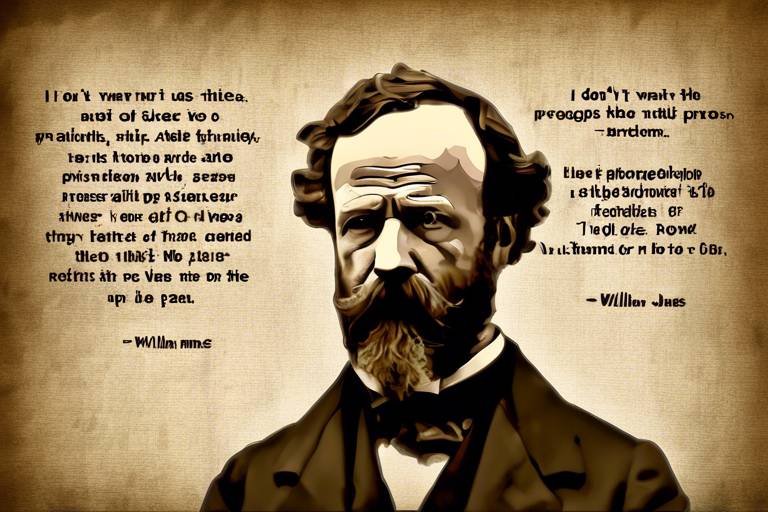Thomas Aquinas's Philosophy - Integrating Faith and Reason
Thomas Aquinas, a towering figure in medieval philosophy, is often celebrated for his remarkable ability to weave together the seemingly disparate threads of faith and reason. Born in 1225 in Italy, Aquinas's philosophical journey was not merely academic; it was a profound exploration of the divine and the nature of human understanding. His works have left an indelible mark on theology and philosophy, resonating through the ages and continuing to influence contemporary thought.
Aquinas’s philosophy is grounded in the belief that faith and reason are not enemies but rather allies in the pursuit of truth. This perspective emerged during a time when the Church faced numerous challenges, including the rise of secularism and the rediscovery of Aristotelian thought. Aquinas adeptly navigated these turbulent waters, establishing a framework that allowed for the integration of rational inquiry within the context of Christian doctrine.
At the heart of Aquinas's philosophy is the assertion that human beings are endowed with the capacity to reason, which can lead them to understand divine truths. He famously argued that while some truths can only be grasped through faith, many others can be comprehended through rational thought. This dual approach not only enriched theological discourse but also laid the groundwork for modern philosophy, inviting future thinkers to explore the relationship between faith, reason, and ethics.
One of the most compelling aspects of Aquinas's work is his systematic approach to theology and philosophy, as exemplified in his major writings, such as the Summa Theologica and the Summa Contra Gentiles. These texts are not just collections of theological musings; they are comprehensive treatises that tackle some of the most profound questions of existence, morality, and the nature of God. Through his meticulous arguments and logical structure, Aquinas invites readers to engage deeply with his ideas, encouraging a dialogue that bridges ancient wisdom and contemporary challenges.
Furthermore, Aquinas's influence extends beyond the confines of religious thought. His ideas on natural law and ethics challenge us to consider how our moral compass is shaped by both divine revelation and human reason. In a world rife with ethical dilemmas, Aquinas's philosophy offers a guiding light, reminding us that the pursuit of truth is a shared endeavor that transcends individual beliefs.
In summary, Thomas Aquinas's philosophy serves as a powerful reminder of the harmony that can exist between faith and reason. His legacy continues to inspire scholars, theologians, and everyday individuals seeking to understand the complexities of existence. As we navigate our own paths, Aquinas’s insights encourage us to embrace both the rational and the spiritual, forging a deeper connection with the world around us.
- What is the main idea of Aquinas's philosophy? Aquinas's philosophy emphasizes the integration of faith and reason, arguing that both are necessary to understand divine truths.
- What are the major works of Thomas Aquinas? His most significant works include the Summa Theologica and the Summa Contra Gentiles.
- How did Aquinas influence modern philosophy? Aquinas's systematic approach to theology and ethics laid the groundwork for future philosophical inquiry, encouraging a dialogue between faith and rational thought.
- What is natural law according to Aquinas? Natural law is the idea that human reason can discern moral truths inherent in the world, guiding ethical behavior.

The Life of Thomas Aquinas
Thomas Aquinas was born in 1225 in the noble family of the Count of Aquino, in a small town in Italy. From a young age, he exhibited a remarkable intellect and a strong inclination towards theological studies. His early education took place at the Benedictine monastery of Monte Cassino, where he was introduced to the rich traditions of Christian thought and philosophy. However, it was his time at the University of Naples that truly ignited his passion for learning, particularly in the works of Aristotle, which would later play a crucial role in his philosophical framework.
At the age of 19, Thomas made a bold decision that would shape his life and legacy. He joined the Order of Preachers, commonly known as the Dominicans, a move that shocked his family. They had aspirations for him to pursue a more traditional path within the aristocracy. Nevertheless, Thomas was unwavering in his commitment to a life of poverty and scholarship. His dedication to the Dominican ideals of preaching and teaching would become evident as he embarked on a journey that would take him across Europe, studying under prominent scholars such as Albertus Magnus in Paris.
Throughout his academic career, Aquinas faced numerous challenges, including skepticism from his peers regarding his reliance on Aristotelian philosophy. Yet, he persevered, believing that reason and faith could coexist harmoniously. His profound insights into the nature of God, ethics, and human existence began to take shape during this period. In fact, his works would later be instrumental in the establishment of scholasticism, a method of learning that emphasized critical thinking and dialectical reasoning.
As Aquinas matured, he produced a wealth of writings that would cement his status as one of the greatest philosophers and theologians in history. His most notable works, including the Summa Theologica and the Summa Contra Gentiles, reflect his ability to synthesize complex ideas into coherent arguments. These texts not only addressed theological questions but also tackled ethical dilemmas, making them essential reading for students of philosophy and theology alike.
Despite his significant contributions to philosophy, Thomas Aquinas's life was not without its struggles. He faced opposition from various factions within the Church, particularly those who viewed his integration of Aristotelian thought as a threat to traditional Christian doctrine. Nevertheless, his unwavering commitment to truth and understanding allowed him to navigate these challenges effectively. His teachings continued to gain traction, influencing generations of thinkers and establishing a legacy that endures to this day.
In 1274, Thomas Aquinas's life was cut short when he passed away on his way to the Second Council of Lyon. His contributions to philosophy and theology, however, were far from forgotten. In 1323, he was canonized by Pope John XXII, and in 1567, he was declared a Doctor of the Church, a title reserved for those whose teachings have had a profound impact on Christian doctrine. Aquinas's life is a testament to the power of faith and reason, and his ideas continue to resonate in contemporary discussions about morality, ethics, and the nature of existence.
In summary, Thomas Aquinas's life was marked by a relentless pursuit of knowledge and a deep commitment to integrating faith with reason. His journey from a noble birth to becoming a revered philosopher and theologian serves as an inspiring narrative of intellectual courage and spiritual devotion.

Historical Context
The historical backdrop of the 13th century was a vibrant tapestry woven with threads of cultural, intellectual, and religious transformation. This era, often referred to as the High Middle Ages, was marked by significant developments in philosophy, theology, and science. It was a time when the intellectual revival of the Western world began to flourish, influenced heavily by the rediscovery of ancient texts, particularly those of Aristotle. The integration of these classical ideas with Christian doctrine laid the groundwork for the scholastic method, which would become a hallmark of medieval education and thought.
During this period, Europe was experiencing a profound shift. The rise of universities in cities like Paris and Bologna created centers of learning where scholars could gather, debate, and expand upon existing knowledge. These institutions became the breeding grounds for intellectual giants, including Thomas Aquinas, who would later emerge as one of the most influential thinkers of the time. The atmosphere was ripe for inquiry, and Aquinas was at the forefront of this movement, seeking to harmonize faith with reason.
Moreover, the 13th century was characterized by a growing tension between emerging scientific thought and established religious beliefs. The Church held immense power, yet the increasing availability of texts from the Islamic Golden Age and ancient philosophers sparked curiosity and debate. Aquinas found himself navigating these turbulent waters, advocating for a synthesis of faith and reason that would allow for a deeper understanding of both the divine and the natural world. His philosophy was not just a reflection of his personal beliefs; it was a response to the broader cultural currents of his time.
In addition to the intellectual climate, the political landscape of the 13th century also played a crucial role in shaping Aquinas's thoughts. The Crusades had opened up new avenues for cultural exchange, while the feudal system was beginning to transform, giving rise to early forms of capitalism and a more interconnected Europe. This dynamic environment fostered a sense of inquiry and a desire for knowledge that would propel thinkers like Aquinas to explore the relationship between human existence, morality, and the divine.
To better understand this historical context, it’s essential to consider the key elements that influenced Aquinas's philosophy:
- Rediscovery of Classical Texts: The translation of Aristotle's works into Latin provided Aquinas with a framework for integrating reason into theological discourse.
- Growth of Universities: The establishment of educational institutions facilitated scholarly exchange and debate, allowing Aquinas to engage with other thinkers.
- Religious Tensions: The interplay between emerging scientific thought and established religious doctrines created a fertile ground for Aquinas's ideas.
- Political Changes: The shift towards capitalism and increased trade opened new perspectives on ethics and human nature.
In summary, the historical context of the 13th century was a confluence of intellectual revival, cultural exchange, and political transformation, all of which profoundly influenced Thomas Aquinas's philosophy. His ability to weave together the threads of faith and reason not only marked a significant milestone in medieval thought but also laid the foundation for future philosophical discourse. Understanding this context is essential for appreciating the depth and relevance of Aquinas's contributions to both philosophy and theology.

Scholasticism Defined
Scholasticism is more than just a buzzword from the medieval era; it represents a profound method of inquiry that shaped the intellectual landscape of the 13th century and beyond. At its core, scholasticism seeks to reconcile faith with reason, creating a framework where theological beliefs and philosophical reasoning can coexist harmoniously. Imagine a bridge that connects two seemingly distant shores—faith and reason are those shores, and scholasticism is the bridge that allows for dialogue and understanding between them.
One of the defining characteristics of scholasticism is its structured approach to learning and teaching. Scholars would gather in universities, engaging in rigorous debates and discussions. This environment fostered a spirit of inquiry that encouraged students to question, analyze, and synthesize various ideas. The method often involved a dialectical process, where opposing viewpoints were presented, dissected, and resolved, leading to a deeper understanding of complex issues. This is akin to a spirited conversation at a dinner table, where everyone brings their unique perspectives to the table, ultimately enriching the overall discussion.
Central to scholasticism is the use of Aristotelian logic, which Aquinas adeptly employed in his writings. By applying logical reasoning to theological questions, he demonstrated that faith need not be blind; rather, it can be illuminated by reason. This approach not only elevated the status of philosophy within the academic realm but also provided a robust framework for theological discourse. The interplay between faith and reason became a hallmark of scholastic thought, setting the stage for future philosophical inquiries.
To better understand the significance of scholasticism, consider the following key elements:
- Dialectical Method: Engaging in structured debates to explore different viewpoints.
- Integration of Logic: Utilizing Aristotelian logic to support theological arguments.
- Focus on Universal Truths: Seeking to uncover truths that transcend individual beliefs.
In essence, scholasticism was not merely an academic exercise; it was a transformative movement that sought to illuminate the relationship between faith and reason. Through this method, thinkers like Aquinas laid the groundwork for modern philosophy, influencing countless scholars and theologians who followed. The legacy of scholasticism continues to resonate today, reminding us that the pursuit of knowledge and understanding is a lifelong journey, one that thrives on curiosity and open dialogue.

Key Figures in Scholasticism
When we delve into the realm of scholasticism, it's impossible to overlook the monumental figures who laid the groundwork for this intellectual movement. Among them, Anselm of Canterbury stands out as a pivotal thinker whose ideas on faith and reason greatly influenced Aquinas. Anselm is perhaps best known for his famous ontological argument for the existence of God, which posits that God, being the greatest conceivable being, must exist in reality because existence is a necessary attribute of greatness. This line of reasoning not only shaped medieval thought but also paved the way for Aquinas's own explorations of divine existence.
Another significant figure is Peter Abelard, whose dialectical method encouraged critical questioning and debate, essential components of scholastic thought. Abelard's work, particularly his Sic et Non, challenged scholars to confront contradictions in scripture and theology, fostering a culture of inquiry that Aquinas would later embrace. Abelard's emphasis on reason and logic as tools for understanding faith directly contributed to the scholastic tradition that Aquinas would come to epitomize.
Additionally, the influence of Aristotle cannot be overstated. His writings on logic and metaphysics provided the framework that Aquinas would adopt and adapt in his own philosophical inquiries. Aristotle's emphasis on empirical observation and rational thought resonated deeply with Aquinas, who sought to synthesize these ideas with Christian doctrine. The integration of Aristotelian philosophy into scholasticism allowed Aquinas to argue for the compatibility of faith and reason, asserting that both could lead to a deeper understanding of truth.
To further appreciate these key figures, let's summarize their contributions in the following table:
| Figure | Contribution |
|---|---|
| Anselm of Canterbury | Developed the ontological argument for God's existence; emphasized the harmony between faith and reason. |
| Peter Abelard | Introduced the dialectical method; encouraged critical examination of theological contradictions. |
| Aristotle | Provided foundational logic and metaphysics; influenced Aquinas's synthesis of reason and faith. |
These figures collectively contributed to the rich tapestry of scholasticism, each adding threads of thought that would eventually be woven into the philosophy of Thomas Aquinas. Their legacy is not just confined to their own time but continues to resonate in contemporary discussions around the interplay of faith and reason. The dialogues initiated by these thinkers remind us that philosophy is not merely an academic pursuit but a vibrant conversation that shapes our understanding of existence and belief.
- What is scholasticism? Scholasticism is a medieval school of thought that sought to reconcile faith with reason, often through rigorous dialectical methods.
- Who was Thomas Aquinas? Thomas Aquinas was a 13th-century philosopher and theologian known for his synthesis of Aristotelian philosophy with Christian theology.
- How did Aquinas influence modern philosophy? Aquinas's integration of faith and reason laid the groundwork for contemporary discussions in both philosophy and theology, emphasizing that both realms can coexist harmoniously.
- What are the Five Ways of Aquinas? The Five Ways are five arguments presented by Aquinas to demonstrate the existence of God, each employing logical reasoning and theological principles.

The Role of Logic
When we dive into the philosophical realm of Thomas Aquinas, one cannot overlook the pivotal role that logic played in his work. Aquinas was deeply influenced by Aristotelian logic, which he masterfully integrated into his theological arguments. Imagine logic as the sturdy bridge that connects the islands of faith and reason; it allows for a meaningful dialogue between the two, fostering a deeper understanding of both. Aquinas believed that reason was not merely a tool for intellectual exercise but a vital component in grasping divine truths.
Aquinas’s approach to logic was not just about following strict rules; it was about employing a method that could lead to profound insights. He utilized syllogisms, a form of logical reasoning where a conclusion is drawn from two premises, to formulate his arguments. This method allowed him to present his ideas in a clear and structured manner, making complex theological concepts accessible to his audience. For instance, in his famous Summa Theologica, Aquinas often starts with a question, presents objections, and then systematically refutes them using logical reasoning. This approach not only showcases his mastery of logic but also engages the reader in a dynamic intellectual process.
Moreover, Aquinas posited that natural reason could lead one to understand certain truths about God and morality. He argued that, while divine revelation is essential, reason serves as a preliminary step in our journey towards faith. This is particularly evident in his Five Ways, where he employs logical arguments to demonstrate the existence of God. By using logical reasoning, Aquinas aimed to show that faith and reason are not adversaries but rather partners in the pursuit of truth.
To illustrate the significance of logic in Aquinas's philosophy, let's consider a simple table that outlines the key elements of his logical framework:
| Element | Description |
|---|---|
| Premises | Statements or propositions that provide the foundation for an argument. |
| Syllogism | A form of reasoning where a conclusion is drawn from two premises. |
| Natural Reason | The ability to understand truths about God and morality through human intellect. |
| Faith | Belief in divine truths that may surpass human understanding. |
In conclusion, Aquinas's integration of logic into his philosophical and theological work transformed the way we perceive the relationship between faith and reason. His legacy continues to resonate today, reminding us that logical reasoning is not just a tool for philosophers but a necessary companion for anyone seeking to understand the deeper truths of existence.
- What is the significance of Aquinas's use of logic? Aquinas's use of logic is significant because it bridges the gap between faith and reason, allowing for a deeper understanding of theological concepts.
- How did Aquinas influence modern philosophy? Aquinas influenced modern philosophy by emphasizing the compatibility of faith and reason, which continues to be a topic of discussion in contemporary thought.
- What are the Five Ways of Aquinas? The Five Ways are five arguments proposed by Aquinas to demonstrate the existence of God, employing logical reasoning to support his claims.

Aquinas's Major Works
Thomas Aquinas, a towering figure in medieval philosophy, produced several major works that have shaped the landscape of theology and philosophy for centuries. His writings are not just academic texts; they are profound explorations of the relationship between faith and reason, ethics, and the nature of existence. Two of his most significant contributions are the Summa Theologica and the Summa Contra Gentiles, both of which continue to be pivotal in religious and philosophical discussions today.
The Summa Theologica, written between 1265 and 1274, is perhaps Aquinas's most renowned work. This comprehensive text is structured in a question-and-answer format, making it accessible and engaging for readers. It covers a wide array of topics, including the existence of God, the nature of man, moral theology, and the sacraments. Aquinas's ability to synthesize Aristotelian philosophy with Christian doctrine is evident throughout this work. He meticulously addresses potential objections to his arguments, demonstrating a deep understanding of both sides of the debate. This approach not only enhances the credibility of his conclusions but also invites readers to engage critically with his ideas.
In contrast, the Summa Contra Gentiles, written around the same time, serves a different purpose. It is aimed primarily at a non-Christian audience, seeking to explain and defend the Christian faith against objections from other philosophical traditions. This work is particularly notable for its rigorous application of reason and logic, as Aquinas seeks to demonstrate the compatibility of faith and rational thought. The Summa Contra Gentiles is structured around four main parts: the existence of God, the nature of God, the creation of the world, and the human condition. Through these discussions, Aquinas not only defends Christianity but also enriches the philosophical discourse of his time.
To further illustrate the impact of Aquinas's major works, let’s take a look at a table summarizing the key features of these texts:
| Work | Focus | Structure | Significance |
|---|---|---|---|
| Summa Theologica | Comprehensive exploration of Christian theology | Question-and-answer format | Foundation for Catholic theology; synthesis of faith and reason |
| Summa Contra Gentiles | Defense of Christianity against non-Christian philosophies | Four main parts addressing various theological questions | Strengthens the rational basis for faith; engages with philosophical objections |
Both of these works exemplify Aquinas's unique ability to blend philosophical inquiry with theological insight. His writings not only provide a framework for understanding complex issues but also encourage readers to explore their own beliefs critically. Aquinas's philosophy is a conversation starter, inviting individuals to ponder profound questions about existence, morality, and the divine.
In addition to these major works, Aquinas wrote numerous commentaries on Aristotle, biblical texts, and various treatises that further enriched his philosophical legacy. His influence extends beyond his own writings; he has inspired countless scholars and theologians throughout history. The integration of faith and reason that Aquinas championed continues to resonate today, making his works essential reading for anyone interested in the intersection of philosophy and theology.
- What is the main theme of Aquinas's philosophy? Aquinas's philosophy primarily revolves around the integration of faith and reason, arguing that both can coexist harmoniously.
- Why are the Summa Theologica and Summa Contra Gentiles important? These works are foundational texts that explore key theological questions and defend the Christian faith using logical reasoning.
- How did Aquinas influence modern thought? Aquinas's ideas laid the groundwork for much of Western philosophy and continue to influence contemporary discussions on ethics, morality, and the nature of existence.

Summa Theologica
Thomas Aquinas, born in 1225 in Italy, was a man whose life was a tapestry woven with threads of faith, intellect, and a quest for truth. Raised in a noble family, he was destined for a life of privilege. However, his early encounters with the Dominican Order sparked a profound transformation, leading him to embrace a life of poverty and scholarship. His education at the University of Naples and later in Paris shaped his philosophical outlook, heavily influenced by the works of Aristotle and the teachings of the Church.
The 13th century was a pivotal time in history, marked by a flourishing of intellectual thought. The rise of universities and the rediscovery of classical texts set the stage for a new era of philosophical inquiry. Aquinas emerged as a key figure in this milieu, where the interplay of faith and reason began to take center stage. The cultural backdrop of the time, filled with debates about the nature of existence and the divine, provided fertile ground for Aquinas's ideas to blossom.
Scholasticism was not just a method; it was a way of life for thinkers like Aquinas. It emphasized rigorous dialectical reasoning, aiming to reconcile faith with reason. This method involved posing questions, examining various viewpoints, and arriving at conclusions through logical analysis. Aquinas's work exemplified this approach, as he sought to harmonize the teachings of the Church with the philosophical insights of the ancient world.
Aquinas was not alone in his intellectual journey. He was influenced by several prominent figures in scholastic thought. Anselm of Canterbury, with his ontological argument for God's existence, and Peter Abelard, known for his emphasis on logic and ethics, both left indelible marks on Aquinas's philosophy. Their contributions helped shape the discourse that Aquinas would later expand upon in his own works.
Logic was the backbone of Aquinas's arguments. By employing Aristotelian logic, he crafted compelling cases for the existence of God and the nature of morality. This logical framework allowed him to dissect complex theological concepts and present them in a way that was both accessible and profound. For Aquinas, reason was not an adversary of faith; rather, it was a tool that illuminated the truth of divine revelation.
One cannot discuss Aquinas without mentioning his monumental works, particularly the and Summa Contra Gentiles. These texts are not only foundational to Catholic theology but have also influenced Western philosophy at large. In the , Aquinas systematically addresses questions of faith, ethics, and the nature of God, making it a cornerstone of scholastic thought.
Aquinas famously asserted that faith and reason are complementary, not contradictory. This idea was revolutionary, suggesting that one could use rational thought to support and deepen one’s faith. He believed that while some truths are revealed through divine revelation, others can be discovered through human reason. This synthesis of faith and reason remains a vital part of philosophical and theological discussions today.
Aquinas's Five Ways are a series of arguments designed to demonstrate the existence of God. Each argument employs a different aspect of reality, such as motion, causation, and contingency, to lead to the conclusion that an uncaused cause must exist. These rational arguments not only showcase Aquinas's intellectual prowess but also illustrate his commitment to integrating philosophical inquiry with theological principles.
In the realm of ethics, Aquinas introduced the concept of natural law, positing that human beings possess an innate ability to discern right from wrong through reason. This idea suggests that morality is not merely a construct of societal norms but is grounded in the natural order established by God. Aquinas argued that by understanding the world around us, individuals can uncover fundamental moral truths that guide their actions.
The legacy of Thomas Aquinas is profound and enduring. His philosophical contributions continue to resonate in modern theology and ethics, influencing contemporary debates about the relationship between faith and reason. The dialogue he initiated remains relevant, as thinkers grapple with the complexities of belief in an increasingly secular world. Aquinas's ability to bridge these worlds exemplifies the timeless nature of his insights.
- What is the main contribution of Thomas Aquinas to philosophy? Aquinas's major contribution is his synthesis of faith and reason, demonstrating that both can coexist harmoniously.
- What are the Five Ways of Aquinas? The Five Ways are five arguments that Aquinas presents to demonstrate the existence of God through rational thought.
- How did Aquinas influence modern ethics? His concept of natural law posits that moral truths can be discerned through human reason, which continues to shape ethical discussions today.
- Why is the Summa Theologica significant? The is significant because it systematically addresses key theological questions and has been foundational in Catholic teaching.

and
Thomas Aquinas was born in 1225 in the Kingdom of Sicily, into a noble family. His early years were marked by a quest for knowledge, which led him to join the Order of Preachers, also known as the Dominicans. This choice was somewhat surprising, given that his family had aspirations for him to pursue a more traditional path in the secular world. However, Aquinas was driven by a profound desire to understand the divine and the world around him. His education took him to the prestigious University of Paris, where he encountered the works of Aristotle, which would profoundly influence his philosophical outlook.
To fully appreciate Aquinas's contributions, we need to understand the 13th century's historical and cultural backdrop. This was a time of great intellectual awakening in Europe, characterized by the rise of universities and a renewed interest in classical philosophy. The interaction between Christian theology and ancient Greek thought was pivotal. Scholasticism emerged as a dominant method of inquiry, seeking to synthesize faith with reason, paving the way for thinkers like Aquinas to flourish.
Scholasticism can be seen as a rigorous method of learning that emphasized dialectical reasoning. It was not merely about memorizing texts but engaging in a critical dialogue with them. Aquinas utilized this method to explore complex theological questions, demonstrating that faith and reason could coexist harmoniously. This approach was revolutionary, as it encouraged scholars to question and dissect ideas rather than accept them at face value.
Aquinas was not alone in his intellectual pursuits. He was influenced by several prominent thinkers of the time. Figures like Anselm of Canterbury, known for his ontological argument for the existence of God, and Peter Abelard, who introduced a more dialectical method of inquiry, played crucial roles in shaping the scholastic landscape. Their works laid the groundwork for Aquinas, who would later build upon their ideas and contribute significantly to philosophical discourse.
Aquinas's philosophical framework heavily relied on Aristotelian logic. He believed that reason was a gift from God, meant to be used in understanding divine truths. By employing logical arguments, Aquinas sought to demonstrate the rationality of faith. This integration of logic into theology was groundbreaking, as it offered a systematic approach to understanding complex spiritual concepts.
Among Aquinas's most significant writings are the Summa Theologica and the Summa Contra Gentiles. These works are not just theological treatises; they represent a comprehensive synthesis of faith and reason. The Summa Theologica, in particular, is considered one of the greatest philosophical texts ever written, addressing questions about God, morality, and human existence. Through these writings, Aquinas left an indelible mark on both philosophy and theology, influencing countless thinkers throughout the centuries.
Aquinas famously asserted that faith and reason are not enemies but rather complementary forces. He argued that while faith provides truths that are beyond human comprehension, reason helps us understand and articulate these truths. This perspective was revolutionary at a time when many viewed faith and reason as inherently conflicting. Aquinas's ability to reconcile these two realms has had a lasting impact on Christian theology and philosophy.
One of the most compelling aspects of Aquinas's philosophy is his Five Ways to demonstrate the existence of God. Each argument offers a unique perspective, integrating rational thought with theological principles. The Five Ways include:
- The Argument from Motion
- The Argument from Causation
- The Argument from Contingency
- The Argument from Degrees of Perfection
- The Teleological Argument (Argument from Design)
Through these arguments, Aquinas skillfully illustrates that belief in God is not merely a matter of faith but can be supported by logical reasoning.
Aquinas's views on ethics are grounded in his concept of natural law. He believed that human beings possess the capacity to discern moral truths through reason. This idea posits that certain ethical principles are inherent in nature and can be understood by all rational beings. Aquinas's natural law theory has had a profound influence on Western ethical thought, emphasizing that morality is not just a matter of divine command but is accessible through human understanding.
Reflecting on Thomas Aquinas's legacy, it's clear that his philosophy continues to resonate in modern discussions about faith and reason. His works are still studied in theological and philosophical circles, shaping the ongoing dialogue about the relationship between science, ethics, and spirituality. As we navigate contemporary issues, Aquinas's insights remind us that faith and reason can coexist, providing a richer understanding of our existence.
- What is the main contribution of Thomas Aquinas to philosophy?
Aquinas's main contribution lies in his synthesis of faith and reason, demonstrating that they can coexist harmoniously. - What are the Five Ways?
The Five Ways are five arguments Aquinas presented to demonstrate the existence of God, integrating logic with theological principles. - How did Aquinas influence modern thought?
Aquinas's ideas on natural law and the relationship between faith and reason continue to influence contemporary discussions in ethics and theology.

Summa Contra Gentiles,
Thomas Aquinas, born in 1225 in Italy, was a philosopher and theologian whose work has profoundly influenced Western thought. He grew up in a noble family and was educated at the University of Naples, where he first encountered the works of Aristotle. This early exposure to philosophy would shape his intellectual journey. Aquinas later joined the Dominican Order, which marked a significant turning point in his life, as he dedicated himself to a path of rigorous study and teaching. Influenced by various thinkers, including Aristotle and Augustine, Aquinas developed a unique synthesis of faith and reason that would define his legacy.
The 13th century was a time of great intellectual awakening in Europe, characterized by the rise of universities and the rediscovery of classical philosophy. This era saw a blending of Christian theology with ancient Greek philosophy, particularly through the works of Aristotle. Aquinas's contributions emerged within this vibrant context, as he sought to reconcile faith with reason, addressing the challenges posed by emerging secular thought. His work in scholasticism became a cornerstone of medieval philosophy, influencing countless scholars and theologians.
Scholasticism was a method of learning that emphasized dialectical reasoning to extend knowledge by inference and to resolve contradictions. Aquinas employed this method extensively, using logical analysis to explore theological questions and defend the Christian faith. This approach not only facilitated deeper understanding but also paved the way for rigorous debate and discussion in academic circles. The significance of scholasticism in Aquinas's work cannot be overstated, as it laid the groundwork for future philosophical inquiry.
In addition to Aquinas, several prominent thinkers shaped the landscape of scholasticism. Figures such as Anselm of Canterbury and Peter Abelard made substantial contributions to philosophical discourse. Anselm is well-known for his ontological argument for the existence of God, while Abelard introduced the concept of nominalism, challenging the prevailing realism of the time. These scholars provided a rich intellectual environment that influenced Aquinas's thought and helped to establish scholasticism as a dominant philosophical tradition.
Aquinas's use of Aristotelian logic was crucial in his philosophical arguments. He believed that reason and faith could coexist harmoniously, and he employed logical structures to articulate his ideas clearly. By systematically addressing objections and presenting counterarguments, Aquinas demonstrated that rational inquiry could lead to a deeper understanding of faith. This integration of logic into theology marked a significant development in the history of philosophy.
Among Aquinas's most significant writings are the Summa Theologica and the Summa Contra Gentiles. These works not only reflect his theological insights but also his commitment to the integration of faith and reason. The Summa Theologica serves as a comprehensive guide to Christian doctrine, while the Summa Contra Gentiles addresses the beliefs of non-Christians, defending the faith against philosophical challenges. Together, these texts have left an indelible mark on theology and philosophy.
Aquinas famously asserted that faith and reason are complementary, not contradictory. He argued that while faith provides truths that surpass human understanding, reason can lead us to these truths and help us comprehend them. This perspective is crucial in a world where science and religion often seem at odds. Aquinas's ability to reconcile these two realms has made his philosophy relevant even today.
One of Aquinas's most notable contributions is his formulation of the Five Ways to demonstrate the existence of God. These arguments, which include the argument from motion and the argument from causation, illustrate his method of integrating rational thought with theological principles. Each way presents a logical pathway leading to the conclusion of God's existence, showcasing Aquinas's brilliance in merging faith with reason.
Aquinas's views on ethics are deeply intertwined with his concept of natural law. He posited that human reason is capable of discerning moral truths inherent in the nature of the world. This idea suggests that ethical behavior is not merely a matter of divine command but can be understood through rational analysis of human nature and the world around us. Aquinas’s natural law theory has had a lasting impact on moral philosophy and continues to influence contemporary ethical discussions.
The legacy of Thomas Aquinas extends far beyond his lifetime. His philosophy has shaped modern theology, philosophy, and the ongoing dialogue between faith and reason. Aquinas's works remain a central part of the curriculum in many religious and philosophical studies, demonstrating the enduring relevance of his ideas. Scholars and theologians continue to engage with his thought, exploring its implications in a rapidly changing world.
The Summa Contra Gentiles is one of Aquinas's most significant works, written as a defense of the Christian faith against non-believers. In this text, Aquinas systematically addresses various philosophical arguments that challenge Christian doctrine, employing reason to affirm the truths of faith. The structure of the work is designed to engage with the ideas of non-Christians, making it a vital resource for understanding the interplay between faith and reason. Aquinas's approach in this work exemplifies his belief that rational discourse can lead to a deeper understanding of divine truths.
Within the Summa Contra Gentiles, several key themes emerge:
- The Existence of God: Aquinas presents arguments that affirm the existence of God, addressing common objections.
- The Nature of God: He explores the attributes of God, emphasizing His simplicity and perfection.
- Faith and Reason: The text illustrates how faith and reason can coexist, providing a framework for theological understanding.
The main argument of the Summa Contra Gentiles is to defend the Christian faith against non-believers by demonstrating the rationality of belief in God and the truths of Christianity.
Aquinas reconciles faith and reason by asserting that both can lead to truth. He argues that while faith provides divine truths, reason can help us understand and articulate these truths.
Aquinas's work laid the groundwork for the integration of Aristotelian philosophy with Christian theology, influencing countless philosophers and theologians throughout history and continuing to be relevant in contemporary discussions on faith and reason.

and their impact on philosophy and theology.
This article explores the philosophical contributions of Thomas Aquinas, emphasizing his synthesis of faith and reason, and how his ideas continue to influence contemporary thought.
A brief overview of Thomas Aquinas's life, including his early years, education, and key influences that shaped his philosophical outlook and theological contributions.
Understanding the historical and cultural backdrop of the 13th century, which influenced Aquinas's work and the development of scholasticism in medieval philosophy.
An exploration of scholasticism as a method of learning and teaching that Aquinas employed, highlighting its significance in the development of Western philosophy.
An overview of other prominent scholastic thinkers who influenced Aquinas, such as Anselm of Canterbury and Peter Abelard, and their contributions to philosophical discourse.
Discussing how Aquinas utilized Aristotelian logic in his arguments, showcasing the importance of reason in his theological framework.
A look at Aquinas's most significant writings, including the Summa Theologica and Summa Contra Gentiles, and their impact on philosophy and theology.
An examination of Aquinas's famous assertion that faith and reason are complementary, not contradictory, and how he reconciled the two in his philosophy.
A detailed analysis of Aquinas's Five Ways to demonstrate the existence of God, illustrating his method of integrating rational arguments with theological principles.
Exploring Aquinas's views on morality and ethics, particularly his concept of natural law, which posits that human reason can discern moral truths.
Reflecting on the lasting influence of Thomas Aquinas's philosophy on modern theology, philosophy, and the ongoing dialogue between faith and reason in contemporary society.
The writings of Thomas Aquinas have left an indelible mark on both philosophy and theology, serving as a bridge between classical thought and modern intellectual landscapes. His works, particularly the Summa Theologica and Summa Contra Gentiles, are not merely academic texts; they are profound explorations of the relationship between divine revelation and human understanding. Through his meticulous arguments and structured approach, Aquinas has shaped the way scholars and theologians approach complex questions about existence, morality, and the nature of God.
For instance, the Summa Theologica is often regarded as a cornerstone of Western philosophy. It systematically addresses various questions about faith, ethics, and the existence of God, using a dialectical method that encourages critical thinking. This method not only influenced theological discourse but also laid the groundwork for future philosophical inquiry. Scholars have since adopted similar frameworks, leading to a more rigorous and analytical approach to philosophical problems.
Moreover, Aquinas's integration of Aristotelian philosophy into Christian theology was groundbreaking. By employing Aristotle's logic and metaphysics, he provided a coherent framework that allowed for a rational understanding of faith. This synthesis has had a lasting impact, as it prompted later philosophers to explore the compatibility of faith and reason further, influencing thinkers such as Descartes and Kant.
In the realm of ethics, Aquinas's concept of natural law has resonated through centuries, advocating that moral truths are accessible through human reason. His assertion that ethical standards are not merely subjective but rooted in the nature of humanity itself has informed contemporary discussions on morality, law, and human rights. This idea continues to be relevant today, as debates around moral relativism and universal ethics persist.
To summarize, the impact of Aquinas's major works on philosophy and theology can be encapsulated in the following points:
- Foundation for Western Philosophy: His works established a systematic approach to philosophical inquiry.
- Integration of Faith and Reason: Aquinas's synthesis of Aristotelian logic with Christian theology paved the way for future discussions.
- Enduring Ethical Framework: The concept of natural law remains a significant reference point in moral philosophy.
Through these contributions, Aquinas has not only shaped the intellectual landscape of his time but has also provided tools for future generations to grapple with the profound questions of existence, morality, and faith.
Thomas Aquinas's main philosophy centers around the integration of faith and reason. He believed that both could coexist harmoniously and that human reason could lead to a deeper understanding of divine truths.
The Five Ways are five arguments presented by Aquinas to demonstrate the existence of God, utilizing logic and observation of the natural world to support his claims.
Aquinas influenced modern philosophy by establishing a systematic approach to ethics and metaphysics, emphasizing the importance of reason in understanding faith and morality.

Faith and Reason
When diving into the philosophical depths of Thomas Aquinas, one cannot overlook his groundbreaking assertion that faith and reason are not at odds, but rather work in harmonious tandem. Imagine trying to navigate a vast ocean without a compass; faith serves as that compass, guiding us through the turbulent waters of uncertainty, while reason acts as the sturdy vessel that keeps us afloat. Aquinas believed that both elements are essential for a complete understanding of truth. He argued that while faith provides us with divine insights, reason allows us to explore and comprehend the world around us.
Aquinas's approach to faith and reason is often illustrated through his famous analogy of the two wings of a bird. Just as a bird cannot soar high without both wings working together, humanity's pursuit of truth requires both faith and reason. He posited that faith illuminates truths that may be beyond human comprehension, while reason helps us make sense of those revelations. This synthesis not only enriches our understanding of God but also enhances our grasp of the universe.
To further appreciate Aquinas's perspective, consider the following key points:
- Faith transcends reason: Aquinas acknowledged that certain truths, such as the mysteries of the Trinity, are beyond human understanding. These truths require a leap of faith.
- Reason supports faith: He argued that rational arguments can lead us to a belief in God, thereby strengthening our faith.
- Complementary roles: Instead of viewing faith and reason as opposing forces, Aquinas emphasized their complementary nature, suggesting that they enrich each other.
Aquinas's belief in the compatibility of faith and reason was revolutionary for his time and laid the groundwork for many theological discussions that followed. He sought to demonstrate that reason could elucidate the principles of faith, making them more accessible to the human intellect. This idea is particularly evident in his renowned work, the Summa Theologica, where he meticulously outlines arguments that support the existence of God using logical reasoning.
In essence, Aquinas didn't just advocate for a blind acceptance of faith; he encouraged a thoughtful engagement with it. He believed that questioning and seeking understanding are essential components of a robust faith. This perspective resonates strongly in today's world, where many grapple with the intersection of science, philosophy, and religion. By embracing both faith and reason, individuals can cultivate a more profound and nuanced understanding of their beliefs and the world around them.
As we navigate our own spiritual journeys, Aquinas's insights remind us that it's perfectly acceptable to ask questions and seek answers. After all, the pursuit of knowledge is a lifelong journey, and integrating faith with reason can lead us to a richer, more fulfilling understanding of our existence.
1. How did Aquinas define faith?
Aquinas defined faith as a virtue that allows individuals to believe in truths that are beyond human understanding, relying on divine revelation.
2. Can reason lead to faith?
Yes, Aquinas believed that logical reasoning could lead individuals to recognize the existence of God and, subsequently, to faith.
3. What is the significance of Aquinas's philosophy today?
Aquinas's philosophy remains relevant as it encourages dialogue between faith and reason, fostering a deeper understanding of both realms in contemporary society.

The Five Ways
Thomas Aquinas's Five Ways are a remarkable synthesis of faith and reason that aim to demonstrate the existence of God through rational arguments. Each of these five proofs is a unique pathway that leads to the recognition of a divine presence, showcasing Aquinas's ability to blend philosophical inquiry with theological truths. Let's delve into these arguments, which not only reflect Aquinas's deep understanding of Aristotelian logic but also his commitment to making faith accessible through reason.
The first way is the Argument from Motion. Aquinas posits that everything in motion must have been set in motion by something else. He argues that if we trace back the chain of motion, we cannot arrive at an infinite regress of movers. Therefore, there must be an initial unmoved mover, which he identifies as God. This argument is akin to a domino effect; one domino knocks down another, but eventually, there must be an initial domino that sets everything in motion.
The second way is the Argument from Causation. Similar to the first, this argument focuses on cause and effect. Aquinas asserts that every effect has a cause, and if we trace back these causes, we cannot have an infinite series of causes. Thus, there must be a first cause, which is God. Imagine a row of dominos falling; each one causes the next to fall. If there were no first domino, the chain reaction could never begin.
The third way is the Argument from Contingency. Aquinas observes that many things in the universe are contingent, meaning they exist but could also not exist. If everything were contingent, then at some point, nothing would have existed. To avoid this paradox, there must be a necessary being that caused the existence of all contingent beings, and that necessary being is God.
The fourth way is the Argument from Degree. Aquinas argues that we see varying degrees of qualities, such as goodness or beauty, in the world. These degrees imply a standard or ultimate source of these qualities. Just as we can measure temperature against a standard thermometer, we can measure goodness against the ultimate good, which is God. This argument emphasizes that without an absolute standard, our understanding of qualities would be meaningless.
The fifth and final way is the Argument from Design. Aquinas points out that the universe exhibits order and purpose, suggesting that it must have been designed by an intelligent being. This is akin to observing a watch; its intricate design indicates a watchmaker. Similarly, the complexity of the universe implies the existence of a divine designer who orchestrated it all.
In summary, Aquinas's Five Ways serve not only as philosophical arguments but also as bridges connecting faith with reason. They invite individuals to ponder the existence of God through logical reasoning while embracing the spiritual implications of their conclusions. These arguments remain relevant today, as they encourage a dialogue between science and faith, urging us to explore the depths of our existence with both intellect and heart.
- What are Aquinas's Five Ways? Aquinas's Five Ways are five arguments that aim to demonstrate the existence of God through reason and logical reasoning.
- Why are the Five Ways important? They provide a philosophical framework for understanding the relationship between faith and reason, showing that belief in God can be supported by rational thought.
- How does Aquinas's philosophy influence modern thought? Aquinas's synthesis of faith and reason continues to shape contemporary discussions in theology, philosophy, and ethics.
- Can the Five Ways be challenged? Yes, while they are influential, they have been subject to critique and debate, especially in light of modern scientific discoveries.

Ethics and Natural Law
When we dive into the realm of ethics, Thomas Aquinas's insights are nothing short of enlightening. He believed that our moral compass is not just a product of divine revelation but is also grounded in natural law. This concept suggests that human beings possess an inherent ability to discern right from wrong through reason. Imagine it as a universal guidebook written into the fabric of our existence, a set of ethical principles that everyone can access regardless of their cultural or religious background.
Aquinas argued that moral truths are not arbitrary; they are rooted in the nature of human beings and the world around us. He posited that by observing the world, we can understand the purpose of our actions and the ultimate good we should strive for. This is where his idea of natural law comes into play. It serves as a bridge between our rational capabilities and our moral responsibilities. According to Aquinas, natural law is derived from the eternal law, which is the divine wisdom of God that governs the universe.
To break it down further, Aquinas identified several key precepts of natural law that guide ethical behavior. These precepts can be summarized as follows:
- Preservation of life
- Development of the community
- Promotion of knowledge
- Pursuit of truth
- Engagement in social relationships
Each of these principles reflects an aspect of human nature and the common good, urging us to act in ways that enhance life and foster community. For Aquinas, the ultimate goal of human actions is to achieve happiness, which he equated with union with God. This is a profound realization, as it means that our ethical decisions are not just about following rules but about seeking fulfillment and purpose in our lives.
Aquinas's approach to ethics emphasizes that reason and faith are not in opposition but rather work together harmoniously. He believed that a well-formed conscience, which is guided by both reason and divine revelation, leads to moral actions that reflect our true nature. This integration of faith and reason is crucial, as it allows individuals to navigate complex moral landscapes without falling into relativism.
In a world filled with ethical dilemmas, Aquinas's natural law theory offers a compass. It encourages us to look beyond personal desires and consider the broader implications of our actions. By grounding ethics in our shared human experience, Aquinas provides a framework that is both timeless and relevant, urging us to strive for the common good while respecting the intrinsic dignity of every person.
1. What is natural law according to Thomas Aquinas?
Natural law, as defined by Aquinas, is a set of moral principles inherent in human nature that can be discerned through reason. It is derived from the eternal law of God and guides individuals in making ethical decisions.
2. How does Aquinas's view of ethics differ from other philosophical perspectives?
While many ethical theories focus solely on human reasoning or divine command, Aquinas's perspective integrates both. He believes that faith and reason complement each other, leading to a more comprehensive understanding of morality.
3. Can natural law be applied in modern ethical discussions?
Yes, Aquinas's natural law theory remains relevant today, providing a framework for addressing contemporary ethical issues by emphasizing the importance of human dignity and the common good.

Aquinas's Legacy
Thomas Aquinas's philosophical contributions have left an indelible mark on both theology and philosophy, shaping the intellectual landscape of the Western world. His ability to harmonize faith and reason has paved the way for future generations to explore the profound questions of existence, morality, and the divine. In a time when faith was often seen as opposing reason, Aquinas boldly asserted their compatibility, a notion that continues to resonate in contemporary discussions.
One of the most significant aspects of Aquinas's legacy is his influence on the development of natural law ethics. This concept, which posits that moral truths can be discerned through human reason, has become a foundational element in Western moral philosophy. The idea that individuals can discern right from wrong through rational thought rather than solely through divine revelation has led to a more nuanced understanding of ethics in various fields, including law, politics, and personal conduct.
Aquinas also played a crucial role in the evolution of scholasticism, a method of critical thought that dominated medieval universities. His systematic approach to theology and philosophy encouraged rigorous debate and inquiry, setting a standard for academic discourse that persists to this day. His works, particularly the Summa Theologica, are still studied in seminaries and philosophy courses worldwide, illustrating his lasting impact on education.
Moreover, Aquinas's integration of Aristotelian philosophy into Christian theology cannot be overstated. By employing logic and reason, he provided a framework that allowed for a more profound understanding of faith. His Five Ways, which are arguments for the existence of God, exemplify this integration, demonstrating how philosophical reasoning can support theological claims. This method of inquiry has influenced not only religious thought but also the broader philosophical community, encouraging a dialogue between faith and reason that remains vital.
In modern times, Aquinas's ideas continue to inspire thinkers across various disciplines. For instance, in the realm of political philosophy, his thoughts on the role of law and governance have influenced contemporary discussions on justice and human rights. His belief in the importance of a moral framework within society resonates with current debates about ethical governance and the role of religion in public life.
Additionally, Aquinas's emphasis on the importance of education and intellectual development has fostered an environment where questioning and exploration are encouraged. His legacy is evident in the way educational institutions promote critical thinking and the pursuit of knowledge as a means to understand both the divine and the world around us.
To summarize, the legacy of Thomas Aquinas is multifaceted and enduring. His contributions to philosophy, ethics, and theology have not only shaped the course of Western thought but also continue to provoke discussion and analysis in contemporary society. As we navigate complex moral and existential questions, the integration of faith and reason that Aquinas championed serves as a guiding light, reminding us that these two realms can coexist harmoniously in our quest for understanding.
- What is the significance of Aquinas's Five Ways?
Aquinas's Five Ways are essential arguments that demonstrate the existence of God through rational thought, showcasing the compatibility of faith and reason.
- How did Aquinas influence modern ethics?
His concept of natural law established a framework for understanding morality through reason, impacting legal and ethical discussions today.
- What role did scholasticism play in Aquinas's work?
Scholasticism provided Aquinas with a method for critical inquiry and debate, shaping his approach to theology and philosophy.
- Why is Aquinas still relevant today?
His ideas on the integration of faith and reason continue to influence contemporary thought in theology, philosophy, and ethics.
Frequently Asked Questions
- Who was Thomas Aquinas?
Thomas Aquinas was a 13th-century Italian philosopher and theologian, widely recognized for his efforts to reconcile faith and reason. His works, particularly the Summa Theologica, laid the groundwork for much of Western philosophy and theology.
- What is the significance of Aquinas's philosophy?
Aquinas's philosophy is significant because it integrates Aristotelian logic with Christian theology, providing a systematic approach to understanding faith. His assertion that faith and reason are not contradictory but complementary has influenced countless scholars and theologians.
- What are the Five Ways of Aquinas?
The Five Ways are five arguments presented by Aquinas to demonstrate the existence of God. They include the arguments from motion, causation, contingency, perfection, and teleology, each providing a rational basis for belief in a divine creator.
- How did Aquinas view ethics and natural law?
Aquinas believed that ethics is rooted in natural law, which posits that human beings can use reason to discern moral truths. He argued that moral principles are universal and can be understood through the natural order of the world.
- What is scholasticism?
Scholasticism is a method of learning that emphasizes dialectical reasoning to extend knowledge and resolve contradictions. Aquinas was a key figure in this movement, using it to explore theological and philosophical questions in depth.
- How did Aquinas influence modern thought?
Aquinas's legacy continues to shape contemporary discussions in philosophy and theology. His integration of faith and reason has sparked ongoing dialogues about the relationship between science, morality, and spirituality.
- What are some of Aquinas's major works?
Some of Aquinas's major works include the Summa Theologica and the Summa Contra Gentiles. These texts explore a wide range of topics, including the nature of God, morality, and the relationship between faith and reason.



















